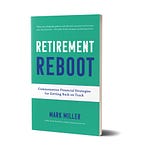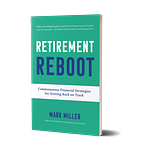
My guest on the RetirementRevised podcast this week is Jill Schlesinger. You probably know Jill from her reports on business for CBS News, or her national weekly radio program on personal finance, Jill on Money.
Jill has just published her first book, The Dumb Things Smart People Do with Their Money. I don’t read many personal finance books or write about them very often - too often, they seem like homework and use simplistic formulas. Or, they’re selling a get rich quick formula (Bitcoin in your retirement account comes to mind). But Jill has a knack for boiling things down, and her great sense of humor makes it all go down easy. So do the funny stories she tells about her own financial mistakes along the way.
Before getting into journalism, Jill got her start on Wall Street, and she also is a certified financial planner. In her book, she runs through 13 of the most costly blunders people make with money; we focused our conversation on four of those mistakes that can do real damage to a retirement plan.
Illinois debate raises questions on taxing retirement income

Illinois is one of the few states that have an income tax but do not tax any retirement income. Two leading business groups recently renewed their calls to change that as part of broader, desperately needed fiscal reforms. The ensuing debate casts a spotlight on an important national conversation about how states should tax retirement income, if at all.
The federal government taxes income from tax-deferred retirement accounts, but Social Security benefits for lower-income retirees are exempt. And taxpayers over age 65 also can take an extra deduction of $1,300 (joint filers) or $1,600 (single filers).
But state policy is all over the map. Data provided by the Institute on Taxation and Economic Policy shows that 11 states tax some portion of Social Security benefits, usually mirroring the federal formula. Many others tax pensions and tax-deferred accounts, although some have exemptions that protect lower-income, public sector workers and military personnel.
Aside from Illinois, just two other states that levy income taxes exempt all retirement income: Mississippi and Pennsylvania.
Learn more in my Reuters Money column this week. You can find more detail on how retirement income is taxed in this backgrounder.
Who spends the big lobbying bucks in financial services?
The fight to protect retirement investors from conflicted advice has been long and difficult. If you’ve ever wondered why some politicians are so eager to fight against the best interests of their own constituents, check out this new ranking of the largest expenditures for lobbying by financial services firms. It’s dominated by trade groups for stock and insurance brokerages and Wall Street. Keep that in mind as you watch the Securities and Exchange Commission cobble together something to replace the U.S. Department of Labor’s now-deceased fiduciary rule.
The SEC is calling its rule “Regulation Best Interest,” and it would be a win for the traditional commission-based stock brokerage industry. As one dissenting commissioner has said, “Perhaps it would be more accurate to call it regulation status quo.”
Jack Bogle, inflation fighter

Vanguard founder Jack Bogle, who passed away in January at 89, sparked an investing revolution by inventing low-cost, passive mutual funds. Some experts think the Vanguard effect puts $100 billion or more back into investors’ pockets every year.
But it turns out you can measure this another way, as Jeff Somer reports in The New York Times:
Now, it turns out, cost savings from various types of index funds, run by Vanguard, BlackRock, Fidelity, Schwab, State Street and others, are having a measurable impact on inflation much as prices for groceries and gasoline do.
In January alone, the Bureau of Labor Statistics found, overall portfolio management costs in the United States “plunged 5.2 percent,” Michael Feroli, the chief United States economist at J. P. Morgan, said in a note on Feb. 14.
Until then, I hadn’t realized that the government tracked management expenses paid by investors. But Mr. Feroli set me straight. He said the effect of falling fees was great enough to make a difference in inflation numbers broadly.
In an email, he said most of the decline in portfolio costs, which the Bureau of Labor Statistics incorporates in the Producer Price Index, could be attributed to cuts in fund fees. That includes traditional mutual funds and exchange-traded funds, a type of index fund.
Who knew? Certainly not me.
Falls can kill you; here’s how to minimize the risk
Falls are the leading cause of fatal and nonfatal injuries among older adults. Every 19 minutes in this country, an older person dies from a fall. But falling is not an inevitable consequence of aging, notes New York Times aging columnist Jane Brody. Most age-related falls are preventable once you know why they happen and take steps to minimize the risk for yourself, relatives and friends whose age or health status renders them especially vulnerable.
Coming up on the podcast

Next week, I’ll be talking with Elizabeth White, author of 55, Underemployed, and Faking Normal, just out from Simon and Schuster. Elizabeth’s book is an intimate account of the loss of employment and career at midlife - both her own, and hundreds of people who she has spoken with since she first started speaking out on the topic in 2016. Don’t miss it!












